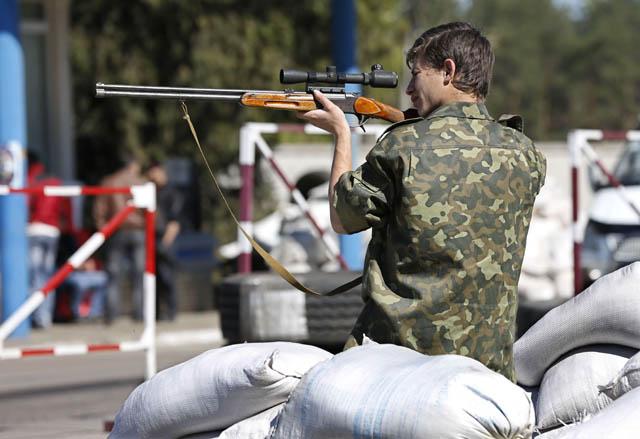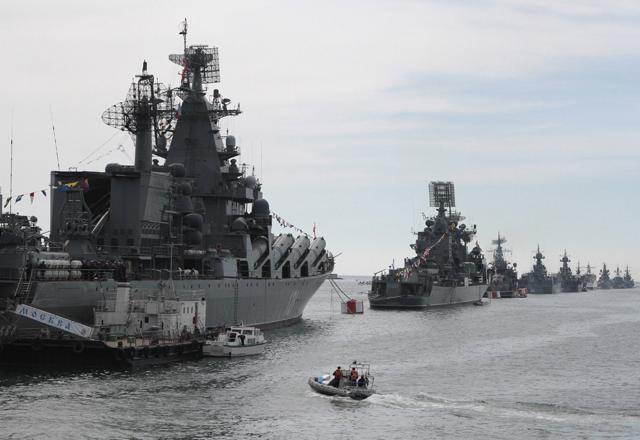You are here
US, EU slap sanctions on Russia as violence rages in Ukraine
By AFP - Apr 28,2014 - Last updated at Apr 28,2014
KOSTYANTYNIVKA, Ukraine — The United States and Europe on Monday whacked Russia with fresh sanctions over Ukraine for failing to stop tensions soaring in the east of the ex-Soviet republic, where rebels seized another town and a pro-Moscow mayor was badly wounded by a shot to the back.
As the West sought to step up the pressure on Moscow over the worst East-West crisis since the Cold War, the White House imposed sanctions on seven Russian officials and 17 firms close to President Vladimir Putin.
The European Union was adding 15 names to its own list, diplomatic sources said.
The Kremlin hit back almost immediately, vowing a “painful” response for Washington, in a tit-for-tat rhetorical battle.
Russian Deputy Foreign Minister Sergei Ryabkov told the Interfax news agency that Moscow was “disgusted” by the US action, which he said showed Washington had “completely lost touch with reality”.
The US said it was prepared to “impose still greater costs” on Russia for what it called its “illegal intervention and provocative actions” in Ukraine.
Among those targeted is Igor Sechin, president and chairman of the board at Rosneft, Russia’s top petroleum company and one of the world’s largest publicly traded oil companies.
Washington is also tightening licensing requirements for certain high-tech exports to Russia that could have a military use.
The Western sanctions are a response to Russia’s perceived lack of action in implementing an April 17 deal struck in Geneva to defuse the crisis.
Washington has threatened to target specific sectors of the Russian economy if the tens of thousands of troops the Kremlin has ordered to the border actually invade Ukraine.
‘Shot in the back’
As the sanctions hammer swung at Russia, tensions on the ground in eastern Ukraine showed little sign of easing.
Kalashnikov-toting militants seized the town hall of Kostyantynivka — the latest of more than a dozen towns held by pro-Russian insurgents who were supposed to have disarmed under the Geneva deal.
AFP reporters in the nearby flashpoint town of Slavyansk said militants on rebel-held checkpoints were visibly more agitated.
Some 300 masked men wielding baseball bats attacked a bank in the regional hub of Donetsk owned by a billionaire oligarch and regional governor who has clashed with Putin.
The pro-Moscow mayor shot in the back, Gennady Kernes, of the town of Kharkiv, was in critical condition. The identity and motive of the gunman who targeted him while he was riding his bicycle were unknown.
Meanwhile, negotiations were still under way to secure the release of a team of international observers from the OSCE, whose capture by rebels on Friday sparked global fury.
The pan-European security organisation held an emergency meeting in Vienna to discuss the rising threat in Ukraine to monitors overseeing the faltering Geneva accord.
The current head of the Organisation for Security and Cooperation in Europe (OSCE), Swiss President Didier Burkhalter, told AFP: “We don’t want to stop, but it is our responsibility to assess the situation steadily... If there is a change, then we will act.”
On Sunday, the rebels presented the OSCE captives — four Germans, a Pole, a Dane, a Czech and a Swede — to the cameras for a news conference slammed as “repugnant” by Germany.
The Swede, who suffers from diabetes, was released late Sunday on medical grounds.
A spokeswoman for the rebels said all seven were “alive and in good health” but scrapped a news conference planned for later Monday.
The International Committee of the Red Cross told AFP it was trying to gain access to the detainees and urged all sides to treat captives “humanely”.
The rebels are also holding three Ukrainian soldiers captured near Slavyansk. Russian television showed the men blindfolded, cuffed and bloodied, stripped to their undergarments.
‘Painful’ response
The Kremlin issued a robust response to the US sanctions, which President Barack Obama had earlier announced in Manila, where we was wrapping up a tour of Asia.
“We will, of course, respond,” Ryabkov said, adding: “We are certain that this response will have a painful effect on Washington.”
The measures taken by Washington and Brussels are “leading things towards an escalation of the crisis”, the minister added.
After a brief period of optimism prompted by the Geneva accord, the crisis has lurched into increasingly dangerous ground, with the Ukrainian prime minister warning that Moscow wanted to trigger a “third world war” with its military manoeuvres near the border.
Ukraine’s army is waging an offensive to quell the separatist movement in the eastern part of the country, which the West believes is fomented and controlled by the Kremlin.
Kiev’s soldiers are surrounding the flashpoint town of Slavyansk in a bid to prevent reinforcements reaching militants there.
Ukraine also threatened to take Russia to court over its threat to cut off gas supplies if Kiev does not pay its bills.
Prime Minister Arseniy Yatsenyuk told reporters Ukraine would pay $2.2 billion to Russia’s state-owned gas company Gazprom if it accepts a price of $268 per 1,000 cubic metres.
“We are waiting for a Gazprom answer.... Unless we reach an agreement within 30 days, we will move from pre-arbitration phase to a legal case,” he said.
The crisis has escalated at breathtaking pace since November when pro-Western protesters in Kiev began mass demonstrations against Kremlin-backed then-president Viktor Yanukovych after he rejected an agreement to bring Ukraine closer to the European Union.
After four months of protests, which turned deadly as authorities tried to break them up, Yanukovych was forced from power.
In response, Moscow launched a blitz annexation of the peninsula of Crimea and stepped up troop movements on the border.
Related Articles
The Group of Seven (G-7) rich countries have agreed to start slapping fresh sanctions on Moscow as early as Monday over the worsening Ukraine crisis amid Western fears of an imminent Russian invasion.
Thousands of pro-Russian protesters assaulted Odessa’s police headquarters Sunday, days after deadly clashes and a fire there killed dozens of their comrades in what Kiev charged was a Russian plot to “destroy Ukraine”.
Pro-Moscow rebels fighting in east Ukraine vowed Thursday to press on with disputed independence referendums, defying a call from President Vladimir Putin to postpone the vote in a bid to ease tensions.















